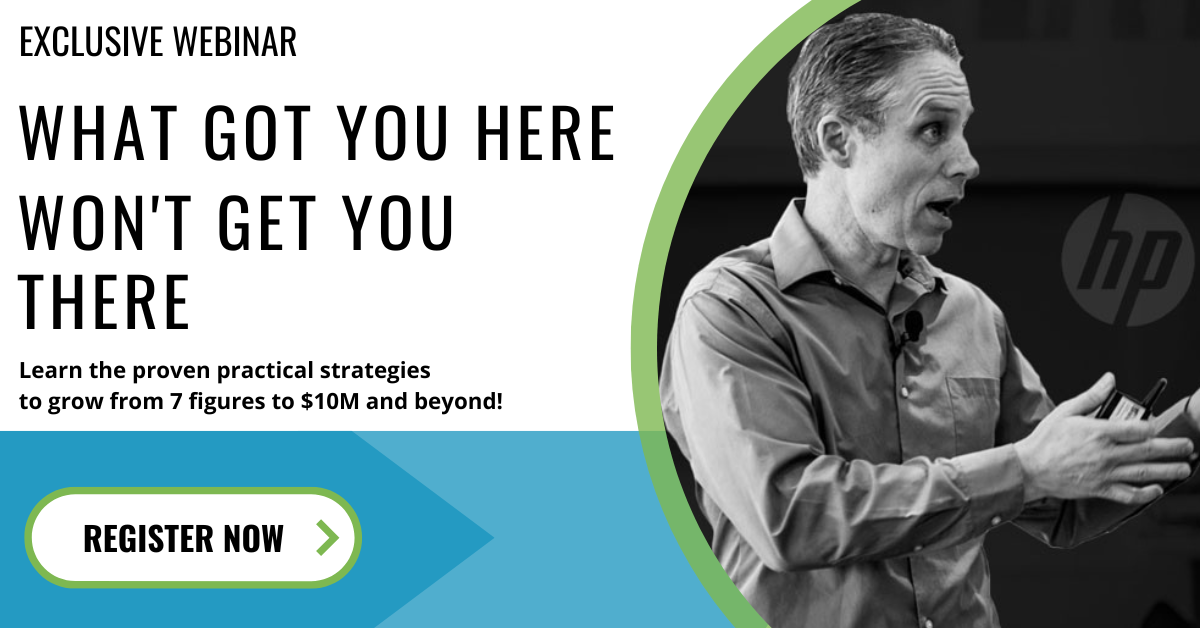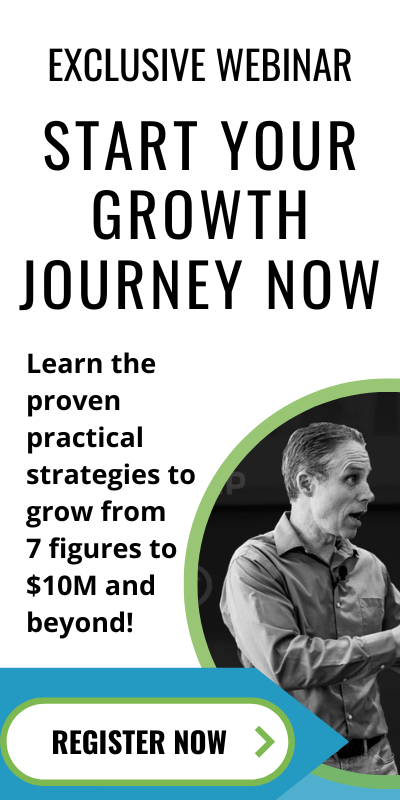Episode 161: Small Business Pivots: Mastering The ‘Go Slow To Go Fast’ Approach In Business With Michael Morrison
Too many business owners ride that initial wave of enthusiasm for a few years, only to plateau later in terms of growth. Is there any way to prevent this from happening to you in the first place? Today’s elite entrepreneur, Michael Morrison, believes that it’s all about having a sustainable approach, and he teaches us how to master the “go slow to go fast” approach in business. Tune in for some incredible actionable tips and strategies!
What the podcast will teach you:
- Why going slow allows you to go fast in business.
- The importance of hiring the right people and getting out of their way.
- The real purpose of business.
- What culture is really about.
Resources:
- https://growwithelite.com
- https://www.michaeldmorrison.com/podcast
- https://www.businessownershipsimplified.com
—
Watch the episode here
Listen to the podcast here
I have the privilege of interviewing some amazing guests when I do this show, and this is definitely no exception to that. My guest in this episode is Michael Morrison. He’s the Founder of a group called BOSS, which is Business Ownership Simplified for Success. I was joking with him before we hit the record that he is the boss, so let’s bring on the boss himself. Michael, welcome to the show.
Thank you very much, sir. It’s a pleasure and honor to be here. I appreciate the opportunity to share with your audience.
We’re trading shares here. You interviewed me for your podcast, but let’s share a little bit more about what you do, including the podcast, and then we’ll get into sharing some things that will be valuable for those seven-figure business owners who are trying to figure out how to break through the next level.
Our podcast is Small Business Pivots, and we talk about pivots that business owners have made to get to that next level as there are thousands of ways you can do that. No business is the same as you know, and nobody’s in the same season or journey of entrepreneurship. We try to listen to guests, and how they’ve done it, and hopefully, it resonates with small business owners that are trying to get to that next level. We try to do the same.

Small Business Pivots: No business is the same, and nobody’s in the same season or journey of entrepreneurship.
I feel like we’re kindred spirits and doing a similar thing with BOSS or the Business Ownership Simplified for Success, which is so fun. You’re trying to help them get back into the position of being a boss in a good way. Not the stereotypical bad boss, but how do we make this simpler? You said as we were starting our conversation that every business is different and there are a thousand ways to get to that next stage, which I agree with.
However, having served as many businesses as you have and having grown businesses yourself, you know there are some things that are similar across those different businesses. Similar principles, similar things to figure out, and similar help. I want to get to some of those things that you found especially helpful as you’ve worked with business owners to help them get to the next level.
Regardless of the industry, the business model, the uniqueness of each business, and I don’t want to discount that. Setting that aside, if you talk to a broader audience of business owners and try to share some helpful things, where do you find some typical things that you come across when working with business owners who are getting past that million-dollar mark, and then they’re starting to hit some roadblocks. They’re starting to hit some things that are keeping them from going further. What are some of the key challenges that they face at that spot?
Key Challenges
With the type of clients that we work with, I find mindset being the top tier there of limited beliefs. A lot of business owners that I’ve worked with and even know, all had a challenge growing up, trials, tribulations, or something that blocked us, whether it be money, “I can’t see myself making that kind of money,” or maybe people made fun of us.
I know for myself, I was an introvert growing up. I was not very studious so I didn’t see myself making that kind of money, as well as I was kidnapped by my biological dad at gunpoint as a young child. I had all these things in my head, “I’m not good enough. I don’t feel qualified enough.” As one of my guests on our show told me, “If you went through trials and tribulations as a kid, you’re qualified.”
It’s because you’re going to get smashed in the face. You’re going to get hit, blindsided, a bloody nose, and all that stuff as an entrepreneur. You’re qualified to do that. I would say mindset is one. Secondly, for a lot of business owners, it’s fun at first until it’s not. We’re riding that honeymoon phase and then we plateau is what I found. A lot of times, we’re the bottleneck as the business owner. We’re in our own way. Getting out of the way, once we feel like, “We’re on this good trajectory. Our business is going well,” and then all of a sudden it’s not. We’re stuck. I find that a lot of us are working in the business and not in the business.
Business is fun at first until it's not. Many business owners ride that honeymoon phase and then plateau. Click To TweetI know that’s a cliché. We hear it all the time. In fact, one of our blog articles is about what it means working in the business and versus on the business so that people understand the difference between the two. I think you and I were talking on our show about what scale means. We hear this buzzword of, “I want to scale my business,” and it’s like, “Do you know what that means?” We start with that framework of, “Do you understand what it means to work on your business, what that means versus in the business?” It’s the mindset and those are a couple of things that I see right off the bat.
We could dive in on all of those things. I guess I’ll steer us to dive down on some of that. On the mindset piece, we won’t get into that entirely, but I’m with you. There’s so much limiting belief that holds us back in life, not just in business ownership, but it shows up in the way that we lead people. In the way that we make decisions and what we’re comfortable with from a risk standpoint or how confident we are in making investments.
All that stuff can be hampered or affected by the way that we bring our head trash to the interaction and the dynamic. That’s huge. I hope everybody will listen to some of your episodes on mindset. I’d like to skip over to that bottleneck issue for a bit, and mindset can be part of this as well. Without oversimplifying it, because again, every business is different, but what are some of the common things that you find with business owners who are getting in their own way? What does it look like first, and then what are some of the practical ways to do something about that?
That’s a great question, and I feel like it’s different for everybody, but a lot of times, I see a business owner who doesn’t have the resources, to begin with. They start doing this. They start trying to learn accounting. They start trying to learn the dashboard on QuickBooks and next thing you know, they’re doing all these things working on an amount of hours throughout the day and they don’t have time to stop and train somebody.
I know I didn’t coin this phrase, but my clients know, I say this all the time. “Go slow to go fast.” For those who feel like they can’t train somebody, take a minute and say, “If I train somebody for 1 day, 2 days, or 3 days, however long it takes with some good SOPs, this person I’m training can write out what I’m asking you to do, the steps that we do it in my company. Take that time to do that and you will save yourself a lot of time in the future.
Go slow to go fast helps a lot of business owners understand that you’ve got to start delegating and you have to start hiring people or investing in vendors that can do things better than you because it seems like small business owners are amazed when I say this. You are not the best employee. You may be a great business owner, but you’re not the best employee. Why not invest in an accountant? Referring back to most business owners try to do their own accounting.
You may be a great business owner, but you're not the best employee. Click To TweetFirst of all, you’re doing it wrong. I promise you. You’re not getting all the benefits. You’re not categorizing. Most of the business owners that I know don’t even understand financials in general. You’re sitting here trying to do your own taxes and accounting. Hire those that know how to do it and invest in those. The objection that I normally hear from business owners is, “I don’t have the funds.” I’m like, “For a good quality cost accountant, you’re spending maybe $500 to $1,000 to get started a month. While they’re doing what you don’t know how to do, go out and find a customer that pays you $500 to $1,000. That’s your first step. That’s, in general, what I would suggest.
We use the word practical a lot in my world, but that’s just practical. It’s like, “Here’s what you do.” You bring in somebody, and it could be an intern, a part-time person, a virtual assistant, or a full-time assistant. It could be a number of resources, but find somebody to take stuff off of you so that you can generate more growth in the business. That in its simplest form is the way to start making a difference. No wonder they call you the boss or I’m calling you the boss.
There are so many sophisticated books out there that I think overcomplicate things, and this is one of those simple things. That’s what we try to find. We have what we call a delegation quadrant. It’s on our website, BusinessOwnershipSimplified.com. It basically walks you through the steps of what you’re good at and what you’re not, and the first things you should delegate so then you know exactly what you should be investing in.
I know a lot of business owners put cheeks in the seats, as I call them. I’m busy. The phone’s ringing off the wall. I need somebody to answer phones and then you’re disappointed a week or two later because that person’s just sitting there doing nothing because we didn’t hire the right person to begin with. In my opinion, you may find it differently because your businesses are on a different scale a little bit but I find that a lot of business owners or businesses are successful based on that first hire.

Small Business Pivots: Your first hire should be your key right-hand person who can be your external brain so that you can move on.
That first hire should be your key right-hand person who can be your external brain so that you can move on because if you don’t, and I learned this from personal experience over two decades ago when I started my very first business. It’s because I didn’t hire the right person to begin with, the next person wasn’t the right person. The person after that wasn’t. The next thing you know, I’m running a daycare. I’m managing personalities, their home life, or whatever it is and it doesn’t work very well. Go slow to go fast. Learn the principles of how to hire, how to delegate, how to be a leader, and you will go so much further so much faster.
Go slow to go fast. Click To TweetI love that perspective and I love how practical you’re making that, Michael. Let’s talk some more about what it really looks like to work on the business and not just in it. We have some lingo sometimes in every business. You mentioned SOPs. I don’t want people to mishear that. SOP is a Standard Operating Procedure. Most of you probably know that, but if you don’t, that’s getting clear on what the work looks like or what each of those tasks looks like. Let’s document them or let’s record them using whatever software you want.
However, let’s make sure that the person in the role understands what’s expected, and what success looks like when we do that work, and then you can hand it off with confidence. Aside from documenting roles, starting to hand things off, and getting an accountant so that you can start doing other activities in the business, I’d love to hear two or three other practical works on the business types of things. It sounds like you have several on your website. What other work on the business tips would you have for them?
Golden Time
For one, I would commit golden time to yourself. We call them the three P’s, which is basically you Plan for it, you Prepare for it, and then you Prosper from it. They’re like, “What should I be working on?” I’m like, “First of all, commit to 90 minutes a week to work on your business, and don’t just go into this thing and sit there.” At 9:00 every Tuesday, you sit there, “What am I going to do? I need to invoice this.” It’s not a catch-up hour. It’s not a catch-up 90 minutes. It’s you focusing on your business.

Small Business Pivots: Plan for it, Prepare for it, and then Prosper from it.
For clients that start working with us, for the first 3 to 6 months, it’s easy because I’m like, “The stuff we’re working on, the stuff we talk about in our coaching sessions, that’s working on the business. Go do your homework on working on the business.” However, for those that are a little more advanced, it’s working on strategies. It’s all about the future, 3 or 5 years. All of our clients are working on 5 and 10 years out now. They’re still working on some immediate things they might need to put their hands on or maybe their direct reports bring to them to think about or strategize about.
However, a lot of times we’re already looking out for the future. Committing to that time and unless you have a family member that’s in the hospital or an emergency, I feel like you’re doing a disservice to your clients, your business, and your employees if you don’t take that time to work on your business. That’s my opinion.
I love the almost sacred way that you’re treating this time. I like those three P’s. Will you repeat those one more time?
It’s prepare, plan, and prosper. When I first started doing this many years ago, it was one time a week. Now, I have two a day. Most people ask me, “How do you get so much?”
Did you say two a day or two a week?
I have two a day. I have 90 minutes in the morning and 90 minutes in the afternoon where I work on our business but because I’ve done it enough times, now I know exactly what we’re doing. When I go into these time blocks, I know exactly what I’m looking to achieve. I know exactly what I’m working on. I know the outcomes I’m trying to get just like you would with a client. We call a client. We’re trying to earn their business. We know what we’re going to say and what we’re looking for the outcome to be.
That’s the planning. Is there anything that I need from our marketing director, my CFO, or anything that I need so I’m not having to stop in that 90-minute block? I’m a big believer that the primary purpose of any business is to turn cash into more cash. How is the company going to benefit from what I’m working on? If it’s not, maybe I need to push that to the side and find something else. If it’s one of those things that needs to be done, I’ll do it if there’s not something more pressing that’s going to turn cash into more cash.
The primary purpose of any business is to turn cash into more cash. Click To TweetMichael, I love where you started with this when you said, “Start with 90 minutes a week.” Why didn’t you say 30 or 60 minutes? Talk to me about 90 minutes.
I wasn’t very studious growing up, but it flipped when I got older. I studied neuroscience a lot. My mom had Parkinson’s disease, so neuroscience is a big part of that. What I learned was you can retrain the brain. You hear that. You’ve heard it in books. I was going to go back to mindset a little bit because there are two books, Mindset by Carol Dweck is a great book for those who are challenged or need a little umph in their mindset, and then the Unfu*k Yourself. Those are two great books that will challenge you if you have limited beliefs. Those are two books I read and I also studied a lot of neuroscience. I understand synapsis. You can retrain and re-trigger those.
The reason for our 90-minute period is that it’s proven that it takes 10 to 15 minutes to truly get in that zone. If you ever think about you’re sitting at a desk and you’re working on a project, especially one that you’re not excited about but once you get into that, you’re in the zone. That takes 10 to 15 minutes. If your phone goes off after you’re in the zone, it takes another 10 to 15 minutes to get back in the zone. I don’t feel like 30 minutes is enough or 60 minutes. You only get out of that 90 minutes. Probably a good 45 minutes to 50 minutes.
Also, at the end, we have that wind-down time. I don’t know about you, but I know for myself where I get so in the zone, I am exhausted. My mental state or my mind is exhausted just like I ran a marathon because I’m so in the zone. It gives you that time to get into it just like you would for a marathon. You warm up, you run, and you cool off. That’s the purpose of the 90 minutes.
I love that. I didn’t know all the science behind that, but I could tell there was something behind your point of view on that. In that 90 minutes, we need sufficient time to do this on the business work. I love when you said, this is not catching up on your task time because that’s exactly what we get sucked into. I’m going to block this time off to do this work on my business.
Some of us salivate at the idea of catching up on some emails or getting those pesky little tasks done. We could easily get sucked into that trap. Even if we make progress and we feel good about that, we don’t work on our business. We just uncluttered our in the business work a little bit which has its merit, but that’s not the progress we’re looking for.
I like that you said a little bit because I promise people that if you are just hitting a task here and a task there, you’re going to get distracted by being reminded of, “I need to call Aunt Susie,” or, “My wife’s birthday is next week.” The next thing you know, you’re not working on your business at all. That’s the purpose of the 90-minute show.
Michael, you didn’t say any recommendations about turning off your technology, shutting things down, or sitting out in a nature park or whatever. There might be best practices for things that you can do to make the most of that time, but at a minimum, don’t give in to the working in the business pull that you’re likely to fill when you separate that time.
I didn’t say the technology side, but you did. That is part of it too. There are some guidelines that I like to, and that’s one of them. Turn off your notifications, your phone, and your emails. That’s the planning part have everything you need to get accomplished what you need to accomplish. These are big things in your business and not just little tasks.
For those of you out there, you heard Michael say 90 minutes twice a day is what he does now. Don’t get freaked out about that. Start with 90 minutes once a week and then you build up to it. However, the point is that he can now do it. Doing it once a week will enable you to get to a point where you can do it twice a week and then you could do it once a day and then eventually be like Michael, twice a day.
That’s a combination of having the right people and having the SOPs in place so that you can focus on 90 minutes. I know for a lot of business owners, they’re like, “My people won’t even let me sit for 10 minutes.” I’m like, “Put one of those little digital clocks or manual clocks on your door.” I know this is one of the biggest objections so I want to cover that real quick because if you do have employees, it’s like, “The phone’s ringing. People need me.”
I say, “People only need you because they don’t know when you’re available next.” When you close your office door, put something on the outside that says, “In a meeting. I’ll be available at 10:15.” I saw this with business owners. They’ll say, “Only if it’s an emergency.” It’s an emergency to everybody because they don’t know when you’re available next but if you say, “Available at 10:15,” all of a sudden this employee is going to go, “I can wait until then,” but when you don’t have nothing and your door’s just closed, it’s an emergency. That might be also helpful.
Getting Out Of The Bottleneck
It’s another great tip. Michael, as you see people working through some of these initial bottleneck things and learning how to work on the business, what are maybe some next-level challenges they start to encounter? Maybe some people have already mastered, “I’m no longer the bottleneck. I am working on my business more.” Let’s talk about one more next-level principle before we wrap up.
Once we get there, it’s different for each business that I’ve seen. A lot of times it is, “Now, what should I be working on?” In other words, I’m not counted on.” What I see with the business owners is we go through these phases of, “I’m doing everything. Everybody’s talking to me. Everybody’s coming to me, and now all of a sudden, they’re not. What should I do now? I’m bored I feel left out. Maybe I should go back out there and help my team.”
No. You need to learn how to be a leader or how to play that role in the phase that you’re in. For instance, one of my guests on the podcast is at that level. They’re a $100-plus million company and he focuses strictly on culture because he went slow to go fast, spent the time to get the right people, get all the frameworks in place, the SOPs, the organizational chart, and all that good stuff. He spends 60% to 70% of his time on the culture as a CEO. He finds that it’s important.
His comment was, and I had never heard this till he said it, but it’s true. We come up with these great culture statements, mission statements, and the vision statement. It gets posted on the wall, but it doesn’t mean anything until people experience it. What he said was, “Your culture is 90 days of what people experience.” I was like, “Wow.” He said, “For me to keep that culture, every day starts a new day of 90 days. If our culture doesn’t stay at that high level, we lose it no matter what that culture statement says in the lobby. You have to fill a different role. You have to learn how to play that role.

Small Business Pivots: Your culture is 90 days of what people experiences.
He focuses on culture. It’s finding whatever that role is that you need to play to keep that company going in the right direction because you and I both know it won’t stay the same. The clients that come to us and they say, “I want to stay around $5 million.” I’m like, “Do you understand it’s harder to stay in one place than it is to keep evolving?” Finding that role that you play best in and spending a lot of your time in there is the next level. Again, every business it’s different, but I think in general, it can fit everybody. I’d say that’s one thing that I see.
Without prompting a response, I gave you a question, but you said the word leadership or leader. You also said the word culture. It’s interesting. These are the less tangible things. They can be a little fuzzy sometimes to people or they might think it’s soft skills, but every business owner who wants to continue to grow their business has to learn how to be a leader and eventually, a leader of leaders. That involves things like intentionally defining and maintaining the culture that they want or it just happens by default. That usually is not a pretty picture, but I love the perspective you shared. Culture has a 90-day shelf life. That’s continually my job. “How do I maintain what people are experiencing here as they come to work?
I had a business owner. I always tell business owners, your business, whether you like it or not, whatever your business is now, you allowed that to happen or you created it to happen. It’s one or the other. You’re the one driving the ship. That’s where this CEO is. He’s like, “I started this and I want to keep it. I want to keep improving it, and in order to do that, this is my company so I have to be the person in charge of that.”
The business owner that I was referring to, not this particular one, but a different one, is on the opposite side of the fence. He is frustrated. He has twenty installers that go out to residential homes and they got a phone call from one of their clients that said, “My house stinks like cigarettes. Every time your employee goes to the service van, they smoke a cigarette and bring that nasty smell back in the house.” He was livid. He was like, “When were people allowed to smoke on the job,” yelling at his team?
I said, “Mr. Businessowner if you don’t mind me interrupting here, when did you allow that to happen?” It’s a fair question. I said, “Did you set the rule that there is no smoking on the job?” He is like, “Years ago. We always talk about that.” I said, “Where’s it written?” This employee that they were talking about has worked for this company for 31 years. I was like, “Somewhere along the line, they got away with that or you allowed it or you said it was okay.” This is your company. The other example of the CEO that doesn’t have it that way and I like what he said. “I always have to work on that. I always have to keep establishing what our foundational culture was or else it goes away.”
I love something that Jim Collins says that I’m sure you’ll appreciate. He says, “The number one job of every great leader is to set the vision.” The vision is purpose, values, and mission. It’s all of those foundational elements. One thing I’ve learned that you described is that setting the vision is not a one-and-done activity. It isn’t that you just paint it on the wall and say, “We did it.” It’s living that. It’s modeling it. It’s teaching it. Everything you do as a leader from here on out is reinforcing, recasting, and recommunicating that core cultural element of purpose and values and what we’re up to together. Thank you for sharing that.
It’s also being adaptable. I find it because we say one thing now, a few years from now, it may not hold the same weight. When I was growing up, we used to say, “Wear your Sunday best.” That was your professional business attire. If you go to any church today, what does that look like? People are wearing hats backwards, shorts, and t-shirts. That kind of thing back in the day that wear suits, ties, slacks, and nice shoes. Being adaptable as well as to, “We said it this way. This is what we want. What does that look like now with this generation?” You’re always having to work on that and as you said, keep challenging your vision statement so that you have one a few years from now.
Keep challenging your vision statement so that you have one a few years from now. Click To TweetYou reminded me of one last thing that I want to share. You said it again beautifully, but a way that I heard it years ago was that all organizations are perfectly designed to get the results they get. That either happened by default or they created it, as you said but everybody should pat themselves on the back and say, “Congratulations. I built the perfect thing for what I’m getting now.”
It’s because that’s what it is. If we want something different, to be less cheeky on that, the cool thing about that idea is we can make it what we want it to be. It doesn’t have to stay the way it is now. It’s been a delight to talk with you, Michael. How can people learn from some of the resources that you’ve put together? I know you shared a website, but how do they connect with you? Do you want to direct them to your podcast, your website, or social? What’s the best way for people to learn more?
BusinessOwnershipSimplified.com is the website. I don’t have a ghostwriter or VA that answers my LinkedIn. I’m very engaged on LinkedIn. That’s the best place to reach out to me. I’m on Facebook, Instagram, TikTok, and all those platforms. The podcast is Small Business Pivots. It’s on all the platforms, but it’s also on YouTube under the same name. Those are the places that they can reach out to me. I’m happy. Michael@MichaelDMorrison.com is my email. If somebody wants to reach out and talk small business, I’m open to that as well. I don’t charge for that.
Michael, you’ve been great here as a guest on our show. Thank you, everyone, for reading. Please be sure to share this episode, like it, and do all the things to help as many business owners as possible hear this great insight from Michael Morrison. Tune in again next time for another great guest as we try to help you achieve your goals in your business. Keep growing.
Thank you.
Important Links
- Small Business Pivots
- Business Ownership Simplified for Success
- Mindset
- Unfu*k Yourself
- LinkedIn – Michael Morrison
- Facebook – BOSS Business Ownership Simplified for Success
- Instagram – Michael D Morrison: Business Coach
- TikTok – Michael D. Morrison
- YouTube – Small Business Pivots Podcast
- Michael@MichaelDMorrison.com
- https://www.BusinessOwnershipSimplified.com/events/podcast
- https://www.BusinessOwnershipSimplified.com/businesslending
- https://GrowWithElite.com/
About Michael Morrison
 Michael Morrison is a business owner, husband, father, and small business coach passionate about helping others live a life they love. Why? Because he’s been there. Being born into a domestic abuse family situation, he grew up feeling lost and unworthy.
Michael Morrison is a business owner, husband, father, and small business coach passionate about helping others live a life they love. Why? Because he’s been there. Being born into a domestic abuse family situation, he grew up feeling lost and unworthy.
After years of doing what everyone else thought was right in life by going to college and getting a job, he decided to pivot in life and in his career and went on to grow a multi-million-dollar company. The road to success in business didn’t come easy. From toxic business partners to bankruptcy, Michael has experienced it all in business and wants to share stories like his, with the next generation so they can create a business that runs without them like he has.
Want to listen to more? View all episodes here >



